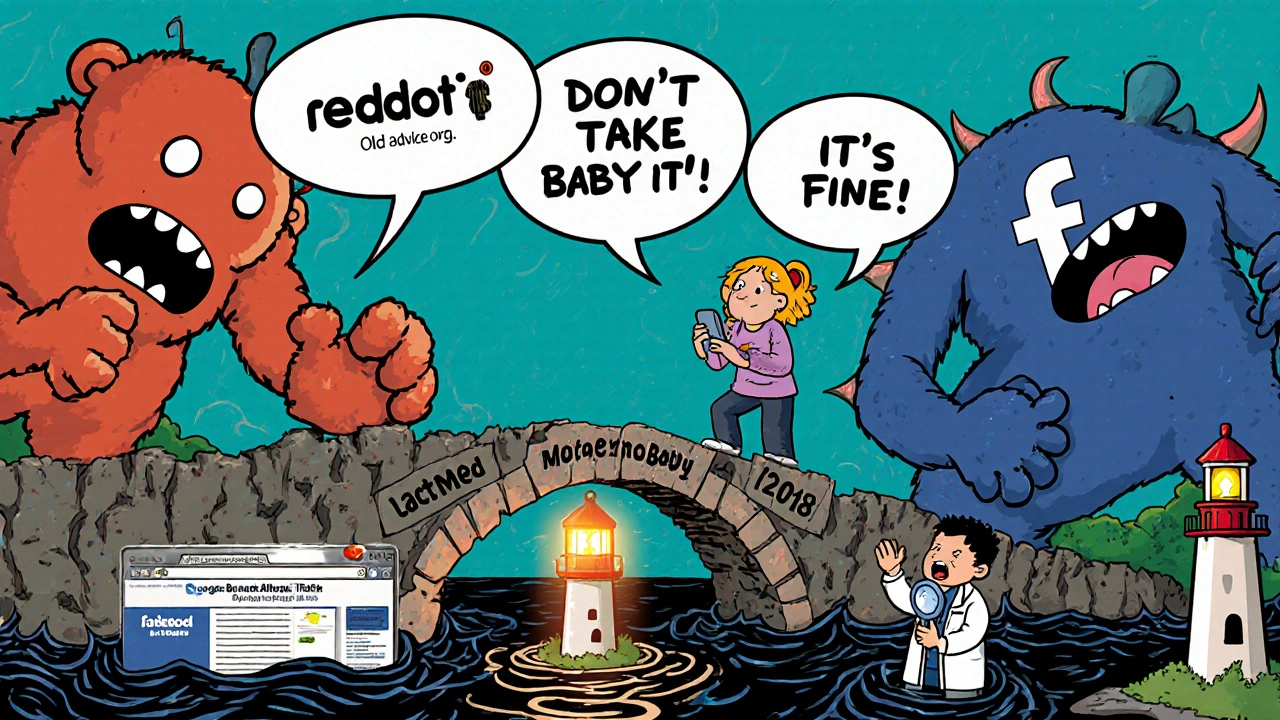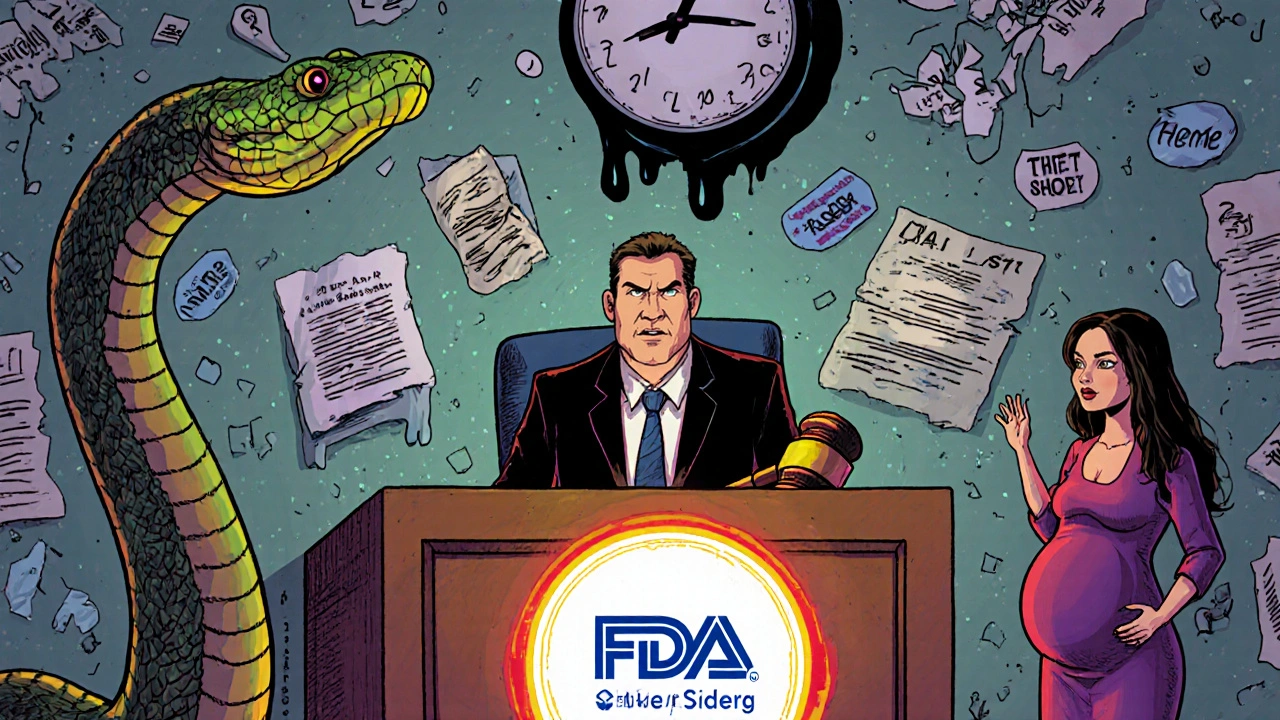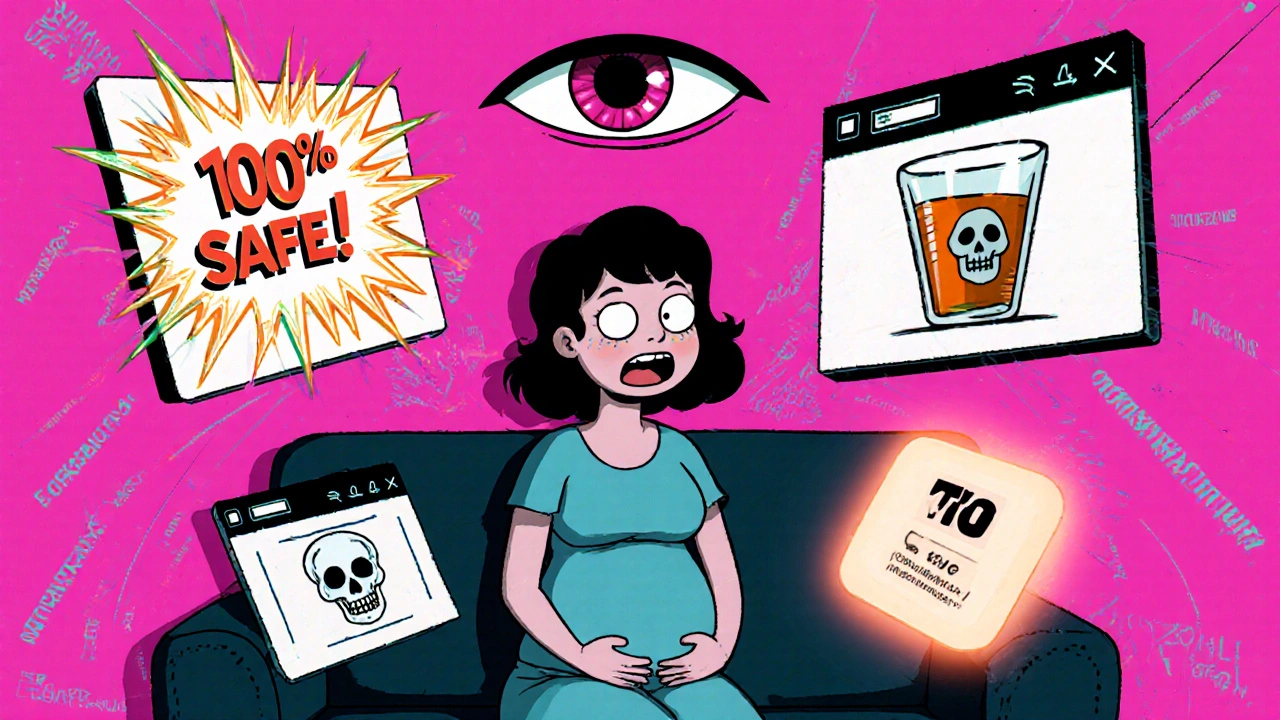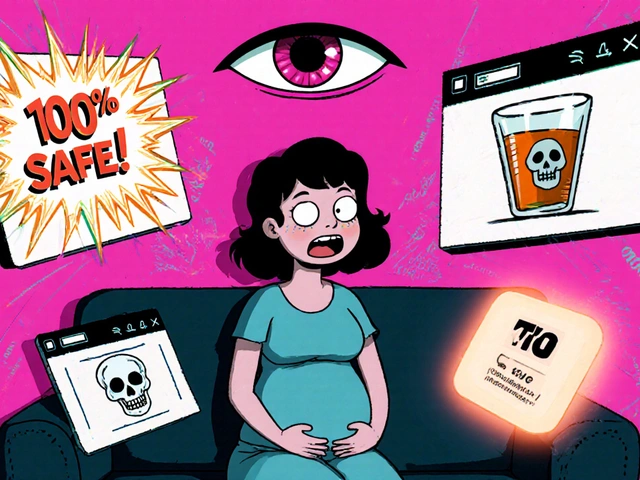Every year, millions of pregnant women turn to the internet to find out if a medication is safe. They search for answers about paracetamol, antidepressants, antibiotics, or even herbal teas. But here’s the hard truth: online pregnancy medication advice is often wrong. A 2019 study found that only 57% of online posts about medication safety during pregnancy matched the gold-standard guidelines from Teratology Information Services. That means nearly half the advice you read could be misleading, outdated, or dangerously inaccurate.
Why does this matter? Because skipping a necessary medication-like lamotrigine for epilepsy or salbutamol for asthma-can be just as risky as taking something harmful. On the flip side, believing a dangerous drug is safe because a Reddit post said so can put your baby at risk. The problem isn’t that there’s too little information. It’s that there’s too much bad information.
Know the Gold Standard: Teratology Information Services (TIS)
Not all advice is created equal. The most trusted system for judging pregnancy medication safety is the Teratology Information Services (TIS) classification. It doesn’t just say ‘safe’ or ‘not safe.’ It breaks things down into four clear categories:
- Safe: Proven no risk to the fetus based on human studies.
- Contraindicated: Known to cause harm. Avoid completely.
- On strict indication or second-line: May be used only if benefits clearly outweigh risks, and safer options aren’t available.
- Insufficient knowledge: Not enough human data to say for sure.
Here’s what’s scary: when a medication falls into the last two categories-where the answer isn’t black and white-online advice gets it wrong over 75% of the time. A post might say, “Don’t take ibuprofen, it causes birth defects,” when the real risk is only high after 20 weeks and even then, only with long-term use. Or it might claim a drug is “100% safe” when it’s only been studied in 50 people. TIS doesn’t guess. It weighs real human data.
Check the Source: .gov, .edu, or Else?
Where the advice comes from matters more than how confident it sounds. A website with a flashy design and a doctor’s photo doesn’t mean it’s trustworthy. Look for these trusted domains:
- .gov - Sites like the CDC, NIH, or FDA. These are government-run and legally required to be evidence-based.
- .edu - University websites, especially those with obstetrics or pharmacology departments.
- MotherToBaby.org - Run by the Organization of Teratology Information Specialists (OTIS), this is the most reliable non-governmental source.
- LactMed - Run by the National Library of Medicine, this database gives detailed, up-to-date info on drugs and breastfeeding.
Anything else? Be skeptical. Pharmacy websites? 53% of pregnant women visit them, but nearly 20% say they’re unhelpful. Commercial blogs? Many are secretly paid for by drug companies. A 2024 study found 42% of “educational” sites hide pharmaceutical sponsorships. If you can’t find who funds the site, assume they have a financial interest in you taking the drug-or avoiding it.
Follow the Evidence: Look for Real Studies
Good advice doesn’t say “studies show.” It says which studies. Look for:
- The name of the journal (e.g., JAMA Internal Medicine, Reproductive Toxicology)
- The year the study was published
- The number of people studied (e.g., “n=95,000 pregnancies”)
- Whether limitations are mentioned (e.g., “only included women under 35”)
For example, accurate advice about paracetamol will cite the 2021 JAMA study that followed 95,000 pregnancies and found no link to neurodevelopmental issues. Inaccurate advice might say, “Animal studies show risk,” but never mention that animals metabolize drugs differently than humans. Or worse, it might cite a 2008 study from a small group of 80 women and present it as gospel.
Don’t trust vague phrases like “many experts agree” or “research indicates.” Real experts cite specific papers. If a source doesn’t give you a DOI link or a journal name, it’s not evidence-it’s opinion.

Check the Date: Old Advice Is Dangerous Advice
Medicine doesn’t stand still. What was considered safe in 2010 might be flagged as risky in 2024. A 2023 NIH webinar reminded clinicians: “Information older than three years should be treated as potentially obsolete.”
Why? Because new studies come out constantly. In 2022, a major study found that certain antidepressants previously thought to be low-risk actually had a small but real link to preterm birth. That changed guidelines overnight. But most websites don’t update their content. A 2003 study by the American Academy of Family Physicians found that 78% of standard drug labels still used outdated pregnancy risk categories (A, B, C, D, X)-categories that were replaced in 2015 with clearer, more detailed summaries.
Always check the last update date. If it’s not listed, assume it’s old. If the site doesn’t mention when the info was last reviewed, don’t trust it.
Use the TRIAD Method: Your Quick Verification System
Here’s a simple, 5-minute system you can use every time you read advice:
- Teratology - Cross-check the drug on MotherToBaby.org or LactMed.
- Review - Find the original study. Does the source cite it? Can you find the same study yourself?
- Date - Is the information less than two years old? If not, dig deeper.
That’s it. No apps needed. No special skills. Just three quick checks. In a 2025 Chinese trial, women who learned this method improved their ability to judge accuracy by 15.7% in just four hours.

Watch Out for These Traps
Even smart people fall for these tricks:
- “Natural” doesn’t mean safe - 63% of women think herbal supplements are FDA-approved. They’re not. Most aren’t tested for pregnancy safety at all.
- Correlation isn’t causation - If a woman takes a medication and has a baby with a birth defect, it doesn’t mean the drug caused it. Many birth defects happen by chance. Good studies control for other factors like age, smoking, or underlying health conditions.
- Reddit and Facebook are not medical journals - A June 2024 thread on r/BabyBumps documented 87 cases where women stopped taking antidepressants after reading online posts. Twenty-nine of them ended up in emergency care. Anecdotes are powerful-but they’re not data.
- Too confident = too risky - Experts say the most reliable sources admit uncertainty. Phrases like “current evidence suggests” or “we don’t know yet” are signs of honesty. Phrases like “100% safe” or “never take this” are red flags.
What to Do When You’re Still Unsure
You don’t have to figure this out alone. Here are real, free resources you can use right now:
- MotherToBaby - Call 1-866-626-6847. They have specialists on standby 24/7 who answer questions about medications, vaccines, and exposures during pregnancy and breastfeeding.
- LactMed - Free database at https://www.ncbi.nlm.nih.gov/books/NBK501923/. Updated weekly.
- ACOG Practice Bulletins - The American College of Obstetricians and Gynecologists publishes clear, evidence-based guidelines for providers. You can read them for free online.
- FDA Drug Safety Podcasts - Biweekly updates on new safety findings. No fluff, just facts.
And if you’re still stuck? Call your OB-GYN or pharmacist. Don’t be embarrassed. They’ve seen this a thousand times. In fact, a 2025 update from the American Academy of Family Physicians now recommends that doctors spend just five minutes during prenatal visits helping patients learn how to spot bad advice. It’s part of care now-not an extra step.
The Future Is Here-But You Still Need to Be Smart
There’s good news on the horizon. In late 2024, the FDA launched a pilot AI tool that scans online claims and flags inaccurate medication advice with 83% accuracy. A new API from the University of Washington, set to launch in late 2025, will let browser extensions instantly check if a pregnancy medication claim is safe. But here’s the catch: these tools won’t fix everything. Social media still rewards outrage and fear. Misinformation gets 3.7 times more shares than corrections.
Technology can help-but it won’t replace your judgment. The most powerful tool you have is your ability to ask: Where did this come from? Who says so? And when was it last updated? That’s not just good advice. It’s your safety net.


It’s terrifying how easily misinformation spreads when it’s wrapped in emotional language-‘natural’ remedies, ‘dangerous’ drugs, ‘everyone knows’ this or that. The real tragedy isn’t that people are searching for answers; it’s that they’re being fed answers that sound right but are built on sand. I’ve seen mothers cry because they were told to stop their antidepressants after reading a Reddit thread, only to later find out the study cited was from 1998 and involved rats. The Teratology Information Services framework isn’t perfect, but it’s the closest thing we have to a compass in this sea of noise. If you’re going to trust something, trust the system that tracks actual human outcomes-not anecdotes, not influencers, not fearmongering blog posts with glowing thumbnails.
The entire internet is a theater of performative concern. Everyone wants to appear informed, but few want to do the actual work. You don’t need an app. You don’t need a viral TikTok breakdown. You need to open a PDF from the National Library of Medicine and read it slowly. The fact that we’ve reduced pregnancy safety to a five-minute checklist-TRIAD, whatever-tells you everything about our collective attention span. We want the answer without the burden of understanding. But here’s the uncomfortable truth: medicine isn’t a podcast. It’s not a comment thread. It’s a decades-long accumulation of data, peer review, and institutional accountability. And if you’re not willing to sit with that complexity, you’re not protecting your child-you’re just performing protection.
They’re hiding the truth. The FDA doesn’t want you to know how many drugs are approved with barely any data. The pharmaceutical companies fund half the ‘trusted’ sites. MotherToBaby? Run by the same people who get grants from Big Pharma. The ‘gold standard’ is a smokescreen. Look at the dates-2015 changes? That’s when the new branding kicked in. The old A, B, C, D, X system was simpler. More honest. Now they bury you in jargon so you don’t realize they’re just repackaging the same risks. Don’t trust anyone who says ‘evidence-based.’ That’s code for ‘we did the bare minimum.’
So let me get this straight-reading a Reddit thread about ibuprofen could get me hospitalized, but calling my OB-GYN is ‘embarrassing’? 😑
why do they always say mother to baby but never say who really runs it? i bet its the same people who made the covid vaccines and now they say its safe but last year they said it wasnt for pregnant women and now its ok? this is all a lie. the gov and big pharma control everything. i read a guy on 4chan who said the real data is buried in a server in switzerland and only 12 people have access. why dont they show us the raw numbers? they scared. they know its bad. and the date thing? every site says updated 2024 but its the same text from 2012. i checked the html code. its copy paste. its all fake. trust no one. call your grandma. she knew more than all these doctors.
In Nigeria we don't have access to these websites you talk about. We go to the market and ask the herbalist. He knows more than your fancy .gov sites. Your American studies don't mean anything here. Our women have been using neem, bitter leaf, and ginger for generations. Your medicine is poison. You call it 'insufficient knowledge' but we call it tradition. You think you're helping but you're just trying to erase our culture. Why don't you study our ways instead of pushing your Western nonsense? We don't need your databases. We have our mothers.
Let’s be real-this whole post reads like a corporate whitepaper written by someone who’s never held a newborn. You’re talking about ‘gold standards’ and ‘peer-reviewed journals’ like they’re holy texts. But here’s what actually happens: a woman in rural Ohio Googles ‘is tramadol safe while pregnant?’ and gets a 2011 blog post that says ‘maybe’-so she calls her pharmacist, who says ‘I’ve seen 200 cases, no issues.’ That’s not anecdotal-that’s clinical experience. You dismiss real-world data because it doesn’t fit your .edu checklist. Meanwhile, women are dying because they’re too afraid to take anything. The real danger isn’t misinformation-it’s paralysis by analysis. Sometimes you just have to trust your provider and your gut. Not every risk needs a DOI.
It is regrettable that the populace has come to rely upon the whims of social media for matters of such critical import as pharmaceutical safety during gestation. The notion that a casual internet user, untrained in pharmacology or teratology, should be permitted to influence medical decisions through anecdotal testimony is not merely irresponsible-it is a dereliction of civic and moral duty. The institutions referenced herein-the CDC, the NIH, LactMed-are not merely sources; they are bulwarks against chaos. To disregard them in favor of unvetted blogs, Reddit threads, or influencer testimonials is to embrace ignorance as a lifestyle. One does not navigate a nuclear reactor by reading Yelp reviews. One does not perform brain surgery using TikTok tutorials. And one does not determine fetal safety based on a comment posted at 2 a.m. by someone who ‘read a study once.’ The burden of proof lies not with the scientist, but with the layperson who chooses to reject established knowledge. This is not opinion. This is obligation.